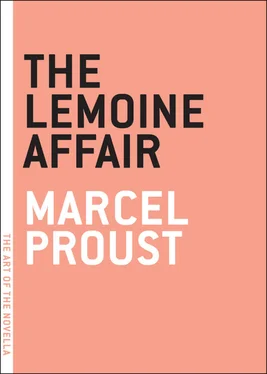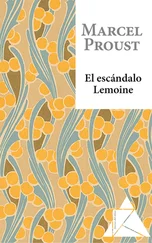22 December .
I awoke from my four o’clock siesta with the presentiment of some piece of bad news. I had dreamt that the tooth that had made me suffer so when Cruet pulled it out, five years ago, had grown in again. And straightway Pélagie came in, with this news brought by Lucien Daudet, news she hadn’t come to tell me earlier so as not to disturb my nightmare: Marcel Proust has not killed himself, Lemoine has invented nothing at all, is nothing but a conjurer who isn’t even very clever, a kind of Robert-Houdin with no hands. Just our luck! For once the present workaday, dull life had taken on some artistry , offered us a subject for a play! Facing Rodenbach, who was waiting for me to wake up, I was not able to contain my disappointment, though I recovered myself sufficiently to become animated, to give vent to some already-composed tirades that the false news of the discovery and of the suicide had inspired in me, false news that was more artistic, truer , than the too-optimistic and public outcome, an outcome à la Sarcey, which Lucien told Pélagie was the real one. As for me, it was nothing but protest that I whispered for an hour to Rodenbach about the bad luck that has always pursued us, my brother and me, making the biggest events into the smallest, a people’s revolution into the sniffles of a stage prompter, so many obstacles raised against the forward progress of our works. Now this time the jeweler’s guild has to get mixed up in it! Then Rodenbach confessed to me the nub of his thinking, which is that December has always been unlucky for us, for my brother and me, a month that saw our pastimes brought to court, and the failure of Henriette Maréchal planned by the press, and the cold sore I had on my tongue the day before the only speech I ever had to give, a cold sore that made people say I hadn’t dared to speak at the tomb of Vallès, when I was the one who had asked to do so — a whole company of mischances that, this man from the artistic North that is Rodenbach said superstitiously, should make us avoid undertaking anything at all this month. Then, when I interrupted the cabbalistic theories of the author of Bruges la Morte so as to go put on the tailcoat required for dinner at the Princess’, I said to him, leaving him at the door of my dressing room: “So then, Rodenbach, you advise me to reserve this month for my death!”
VI “THE LEMOINE AFFAIR” BY MICHELET
The diamond can be mined at strange depths (1300 meters). To bring the most brilliant stone back, which alone can support the fire of a woman’s gaze (in Afghanistan, a diamond is called “the eye of flame”), you will have to descend endlessly into the dark kingdom. How many times will Orpheus wander astray before he brings Eurydice back to daylight! But be not discouraged! If your heart loses its resolve, the stone is there, and with its very distinct flame seems to say, “Courage, one more blow with your pickaxe, and I am yours.” But one moment of hesitation, and you are dead. There is salvation only in speed. A touching dilemma. To resolve it, many lives wore themselves out in the Middle Ages. It was posited more harshly at the beginning of the twentieth century (December 1907—January 1908). Someday I will relate that magnificent Lemoine affair, the greatness of which no contemporary has suspected; I will show the little man, with clumsy hands, his eyes burning with the terrible search, a Jew probably (M. Drumont said so not without plausibility; even today the Lemoustiers — a contraction of Monastère — are not uncommon in the Dauphiné, the chosen land of Israel throughout the whole Middle Ages), leading all of Europe’s politics for three months, forcing proud England to consent to a trade treaty that was ruinous for it, to save its threatened mines, its discredited companies. No doubt it would pay his weight in gold for us to yield the man up. His release on bail, the greatest conquest of modern times (Sayous, Batbie), was three times refused. The deductive German in front of his stein of beer, seeing the shares in De Beers go down day by day, took heart again (the Harden retrial, Polish law, refusal to answer the Reichstag). Touching immolation of the Jew throughout the ages! “You slander me, stubbornly accuse me of treason against all evidence, on land, on sea (Dreyfus affair, Ullmo affair); well then! I give you my gold (see the great development of Jewish banks at the end of the nineteenth century), and more than gold, what you could still not buy with the weight of gold: the diamond.” —Grave lesson; very sadly did I meditate on it during that winter of 1908 when nature itself, abdicating all violence, became treacherous instead. Never were there fewer harsh cold spells, but there was a fog that even at noon the sun could not contrive to pierce. What’s more, the temperature was very mild — all the more lethal. Many deaths — more than in the preceding ten years — and, in January, violets under the snow. One’s mind was quite disturbed by this Lemoine affair, which quite correctly appeared to me immediately as an episode in the great struggle of wealth against science; every day I went to the Louvre where instinctively the people linger, more often than they do before da Vinci’s Mona Lisa, at the Crown diamonds. More than once I’ve had trouble getting close to them. It goes without saying, this study attracted me, but I did not like it. And my reason? I did not sense any life in it. Always that has been my strength, my weakness too, this need for life. At the high point of the reign of Louis XIV, when absolutism seems to have killed all freedom in France, for two long years — more than a century — (1680–1789), peculiar headaches every day made me think that I was going to be forced to abandon my history. I didn’t really recover my strength until the Tennis Court Oath (20 June 1789). I felt similarly disturbed before this strange realm of crystallization that is the world of the stone. Here there is no more of the flexibility of the flower that, at the most arduous of my botanical researches, very timidly — all the better — never stopped giving me courage: “Have confidence, fear nothing, you are still in the midst of life, in history.”
VI IN THE WEEKLY THEATER REVIEW BY M. ÉMILE FAGUET
The author of Le Détour and Le Marché —namely M. Henri Bernstein — has just had a play, or rather an ambiguous combination of tragedy and vaudeville, performed by the actors of the Gymnase, which may not be his Athalie or his Andromaque [Racine], his L’Amour Veille [Henry Roussel] or his Les Sentiers de la Vertu [Robert de Flers], but yet is something like his Nicomède [Corneille], which is not at all, as you may have heard, a completely contemptible play and is not at all entirely a disgrace to the human spirit. Although the play has reached, I will not say beyond the heavens, but at least up to the highest clouds, where there is some exaggeration, it has done so with legitimate success, since M. Bernstein’s play abounds with improbabilities, but on a background of truth. That is where The Lemoine Affair differs from La Rafale , and, in general, from all of M. Bernstein’s tragedies, as well as from a good half of Euripides’ comedies, which abound in truths, but on a background of improbability. What’s more, this is the first time a play by M. Bernstein involves actual people, from whom he had held back till now. The swindler Lemoine, then, wanting to dupe people with his alleged discovery of how to make diamonds, goes to see … the greatest diamond-mine owner in the world. As implausibility goes, you will agree that that is a rather considerable one. This is one thing. At the very least, you expect that that magnate, who has all the greatest affairs in the world to occupy him, will send Lemoine packing, just as the prophet Nehemiah said from atop the ramparts of Jerusalem to those who held out a ladder for him to come down, Non possum descendere, magnum opus facio . That would have been the perfect response. But not at all, he hurries to use the ladder. The only difference is that instead of going down, he climbs up it. A bit youthful, this Werner. This is not a role for M. Coquelin the younger, but rather for M. Brulé. And now for another thing. Note that Lemoine does not make a gift of this secret, which naturally is nothing but a trifling quack recipe. He sells it to him for two million francs, and still makes him think it’s a steal:
Читать дальше



![Marcel Proust - In Search of Lost Time [volumes 1 to 7]](/books/579170/marcel-proust-in-search-of-lost-time-volumes-1-to-thumb.webp)








